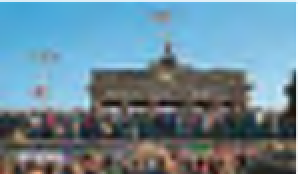Travel Reference
In-Depth Information
Dutschke and others propounded
political change, free love and a
reappraisal of Germany's Nazi
past. The movement came to an
untimely end when Dutschke
was assassinated in April 1968.
1953: workers on a frieze in Frankfurter Allee
production. Soviet tanks sup-
pressed the rebellion while, in
West Berlin, the uprising was
interpreted as a demonstration
for German unification.
1989: Fall of the Wall
The fall of the Berlin Wall in
November 1989 heralded a new
dawn. For the first time in 30
years, Berliners from both halves
of the divided city were able to
visit each other. The town cele-
brated all along Ku'damm and in
front of the Brandenburg Gate.
1961: Building of the Wall
The building of the Berlin
Wall, which commenced during
the night of 12 August 1961,
was, after the surrender of 1945,
the second most traumatic event
for many Berliners. Many fami-
lies were torn apart by the con-
crete wall and more than 100
people were to be killed over the
following 30 years at the border
dividing East and West.
Celebrations after the Fall of the Berlin Wall
1963: “I am a Berliner”
No other politician was as
enthusiastically received in Berlin
as the US President John F.
Kennedy. On 17 July 1963, in
front of Rathaus Schöneberg, he
declared to the cheering crowd:
“I am a Berliner . Berliners
had forgiven the US for staying
silent when the Wall was built.
Kennedy confirmed once more
that the Western Allies would
stand by Berlin and support the
town, just as they had done
during the blockade of 1948-9,
when the US and Britain air-lifted
food to the “island” of
West Berlin.
When the Wall was built, Willy
Brandt, then governing mayor of
West Berlin, had promised:
“Berlin will survive!” He was
right.
1991: Berlin becomes the
capital of Germany
In 1991, Berlin was officially
declared the capital of the
reunified Federal Republic of
Germany. Allied Forces left the
city during 1994, but it was only
when the Bundestag, the
German parliament, moved here
from Bonn on 19 April 1999 that
Berlin became the “real”
capital. Today,
all the main
ministries, the
Bundesrat (upper
house), and the
Chancellor's and
the President's
offices are based
in Berlin.
1968:
The late
Sixties
During the late
1960s, West
Berlin students
transformed
Germany. Rudi
1991: Berlin becomes the capital
For famous Berliners
see pp50-1
43












